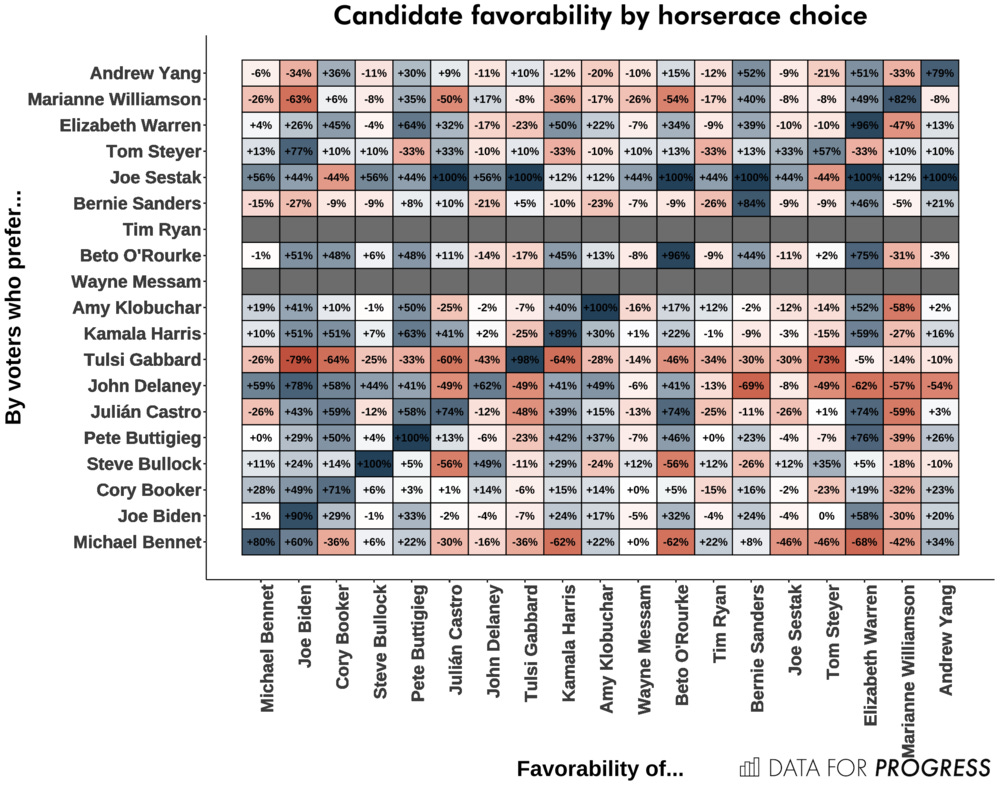A brewing 2020 Democratic revolt?
Supporters of fringe Democrats, and Bernie Sanders, voice likelihood of disloyalty in 2020
The takeaway: A substantial number of Democratic voters say they might not vote for their party’s nominee next November. According to political polls, these voters are much more likely to be supporters of Bernie Sanders, Andrew Yang or Tulsi Gabbard than other candidates. What makes them less wed to the party’s decision-making process?
Editor’s note:
Thanks for reading my thoughts on this subject. And thanks for subscribing! Your membership adds up and makes all this newslettering possible (reminder: I do all this work independently). Please consider sharing online or with a friend; the more readers, the merrier!
As always, send me your tips about what you’d like to read about next. Or what you don’t want to read. Or your feedback otherwise. I’m elliott@thecrosstab.com, or @gelliottmorris on Twitter.
Thanks all,
—Elliott
PS! I’m giving away free trials to this newsletter from now until November 1st. I’d love if you shared them with your friends. Click the button below or share this link: https://thecrosstab.substack.com/subfriends
Contested primaries often bring with them speculation that supporters of some candidates will be unwilling to support others should they become the nominee instead. In 2016, both Republicans and Democrats voiced concerns that voters who favored Donald Trump and Bernie Sanders might not bite the bullet and vote for more “establishment” candidates in the general election. Even today, in the year of our lord 2019, some people claim that Democrats who wanted Sanders and not Hillary Clinton to be the Democratic nominee for president cost her the 2016 election. But there is little evidence that party disloyalty in 2016 was higher than in past years, and it’s unclear if these patterns are ever really electorally decisive anyway.
But will 2020 be different? Perhaps. According to the latest polling from YouGov and The Economist, 6% of Democrats and 8% of Republicans say their 2020 vote will “depend” on who is nominated for the Democratic ticket. For what it’s worth, that’s not a whole lot of voters, and departures from the party line could end up canceling each other out.
This is odd, right? Have we not been led to believe Democrats only care about beating Donald Trump in November 2020? Actually, no, we have not. A March USA TODAY/Suffolk University poll found that 55% of Democrats said beating Trump was their most important goal versus 2020, while 35% said that nominating a candidate who matches their ideology/principles was more important.
So I wonder: Who are these Democrats who are on the fence? Are they more likely to be ideologies? According to The Economist and YouGov’s data, the voters are disproportionately supporters of Bernie Sanders, Andrew Yang and Tulsi Gabbard:

On some level, this makes sense. The constituency for these candidates is younger, more liberal and more likely to object partisan labels (many say they are Independents). They are less likely to buy into the influence of party elites and have rejected “establishment” candidates and talking points. Just last week, Gabbard sparred with Hillary Clinton over comments she made about Russians and Republicans pulling for Gabbard’s candidacy, calling the former secretary of state the “personification of the rot that has sickened the Democratic Party for so long”.
That these potentially disloyal voters might also be more likely to defect shows up in the negative feelings they harbor toward other Democrats. The following graph, from Data for Progress, shows that Sanders, Yang and particularly Gabbard voters are especially hostile toward other Democratic nominees. (So are, for what it’s worth, supporters of Michael Bennet, the senator from Colorado, and those who want spiritual guru Marianne Williamson to be the nominee).

So here’s the question: What are Democrats planning to do about this? While disloyalty might not end up deciding the 2020 election, the fact that it hasn’t before it certainly not a good reason to not worry about voters casting their ballots for someone else.
And then there’s the whole matter that I for one would prefer to not spend the next 5 years arguing about whether a Jill Stein-like candidate cost Democrats the White House in 2020. (It’s exhausting. I don’t like it.)



